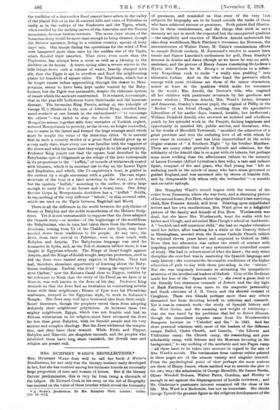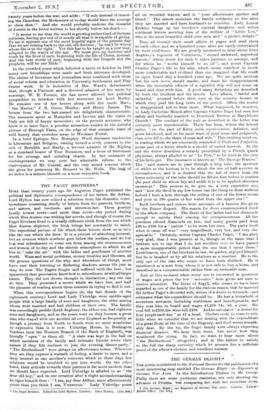MRS. HUMPHRY WARD'S RECOLLECT/ONS.*
Ma.s. HVBIPRRY WARD does well to call her book A Writer's Recollections, for not only was the literary instinct early developed in her, but she has counted among her intimate friends an unusually large proportion of men and women of letters. But if the literary flavour predominates, this is very far from being a chronicle of the inkpot. Sir Edward Cook in his essay on the Art of Biography has insisted on the value of those touches which reveal the humanity • ,41 Writer's liccoiledions. By Mix Bumphry Ward. London : Collins. 11.2a. 6d, net.] of greatness, and reminded us that some of the very lest subjects for biography are to be found outside the ranks of those who have achieved success or greatness. Both points find illustra- tion in these reminiscences, and the things that stick in one's memory are not so much the expected but the unexpected qualities —the simplicity and emotion of Matthew Arnold underneath his skin-deep worldliness, Mark Pattison's'reverence for Newman, the inconsistencies of Walter Pater,. M. Taine's conscientious efforts to sample British cookery, M. Jusserand's resolve to master lawn tennis and Signor Lanciani's enthusiasm for golf, Dean Stanley's interest in deaths and dates (though as we know he was no arith- metician), and the picture of Henry James translating McAndrew's Hymn into French for M. Bourgat or instructions to a refrac- tory Neapolitan cook to make " a really nice pudding " into idiomatic Italian. And on the other hand the portraits which emerge with most vividness are those of the minor characters, minor at least in the qualities which make for resonance in the world : Mrs. Arnold, the Doctor's, wife, who inspired all her children with passionate reverence by her goodness and serene wisdom ; Thomas Arnold, Mrs. Ward's father, dreamer and democrat, Stanley's dearest pupil, the original of Philip in the " Bothie " of his friend Clough, recoiling from the speculative Liberalism of his earlier days, learned, lovable, but ineffectual ; William Delafleld Arnold, who crowned an isolated and rebellious youth by his splendid work in the Punjab, finding happiness and opportunity in married life, public service, and literature, who, in the words, of Meredith Townsend, " moulded the education of a great province and won the enduring love of all with whom he ever came in contact," and has been immortalized in the noble elegiac stanzas of " A Southern Night " by his brother Matthew. There are many other portraits of friends and relations, for the solidarity of the Arnold clan is on a par with its talents, but perhaps none more striking than. the affectionate tribute to the memory of Laura Tennant (Alfred. Lyttelton's first wife), a rare and radiant figure, compact of fire and grace, who died young but. " left an enduring mark in the minds of many who have since, governed or guided England, and was mourned also by stores of humble folk, and bty disagreeable folk whom only she befriended "—a notable and enviable epitaph.
Mrs. Humphry Ward's record begins with the return of the exiles from. Tasmania, where she was born, and a charming picture of her second home, ForcHow, where the great Doctor's last surviving child, Miss Frances Arnold, still lives. Drawing upon unpublished letters and her own recollections, Mrs. Ward gives us a delightful picture of the family and friends of FOX How. Wordsworth was dead, but she knew Mrs. Wordsworth, went for walks with her father and Clough, and attended Miss Clough's school at Ambleside. A " bookish and self-conscious child," she had no regular education until her father, after teaching for a while at the Oratory School in Birmingham, seceded from the Roman Catholic Church (which he rejoined eleven years later) and migrated to Oxford in 1865. Even then her education was rather the result of contact with inspiring personalities than of any systematic or controlled course of study. She had to relearn most of what she knew; the only strict discipline she ever had was in mastering the Spanish language and early history; she contrasts the favourable conditions of the higher education of girls to-day with those prevailing in the "sixties." But she was singularly fortunate in attracting the sympathetic attention of the intellectual leaders of Oxford. Coxe of the Bodleian made her free of the " Spanish room " ; she owed a great deal to the friendly but strenuous counsels of Jewett and the dry light of Mark Pattisen, but even more to the magnetic personality and frank criticism of J. R. Green and the shrewd counsel of Creighton. These two friends perhaps more than any others dissuaded her from devoting herself to criticism, and research. Yet it was in research work—the study of Spanish history and the West Goths, and the meaning and weight of testimony— that she was faced by the problems that led to Robert Elsmere, though the immediate• impulse came from Dr. Wordsworth's Bampton Lecture on "-Unbelief and Sin " in 1881. And her close personal relations with most of the leaders of the different camps, Balliol, Christ Church, and Lincoln, " the Liberal and Utilitarian camp, the Church camp, the researching and pure scholarship camp, with .Seience and the Museum hovering in the background," to say nothing of the aesthetic and nee-Pagan camp —all these have to be taken into account in regard to the aim of Mrs. Ward's novels. The testimonies from various -critics printed in these pages are of the utmost variety and singular interest. From the psychological point of view perhaps the most curious are those of Henry James, whose method was to rewrite the plot in his own way; the admiration of George Meredith, Sir James Barrie, Oliver Wendell Holmes, Walter Pater, Gosohen, and Huxley is enough to set against the disparagement of hostile reviewers ; and Mr. Gladstone's passionate interest remained till the close of his life. Mrs. Ward is a Modernist, but not an iconoclast. She thinks George Tyrrell the greatest figure in the religious development of the twenty years before the war, and adds : " If only instead of desert- ing the Churches, the Modernists of to-day would have the courage to claim them!" And she would probably endorse the remarks of Jowett in the letter written to her shortly before his death :-
" It seems to me that the world is growing rather tired of German criticism, having got out of it nearly all that it is capable of giving. To me it appears one of the most hopeful signs of the present day that we are coming back to the old, old doctrine, ` he can't be wrong whose life is in the right.' Yet this has to be taught in a new way, adapted to the wants of the age. We must give up doctrine and teach by the lives of men, beginning with the life of Christ, instead. And the best words of men, beginning with the Gospels and the prophets, will be our Bible."
In the crowded, years which followed a move to London in 1881 many new friendships were made and fresh interests developed. The claims of literature and journalism were combined with those of social reform and education in University Settlement and Play Centre work. It is indicative of Mrs. Ward's detachment that, though a Unionist and a devoted admirer of her uncle by marriage, W. E. Forster, she has never allowed her political sympathies to interfere with her reverence for Lord Morley. He remains one of her heroes along with her uncle Matt., " the Master," J. R. Green, Huxley, and Henry James. The letters from the two last-named are delightfully characteristic. The summers spent at Hampden and Levens and the visits to Italy are full of happy memories ; to the present reviewer, who knew it in later days, a peculiar attraction resides in the faithful picture of Borough Farm, on the edge of that romantic tract of wild Surrey that stretches away to Woohner Forest.
In a brief Epilogue Mrs. Humphry Ward discusses tendencies in Literature and Religion, owning herself a tardy convert to the cult of Meredith and Hardy, a fervent admirer of Mr. Kipling as a standard-bearer of True Romance, and a lover of Stevenson for his courage and unfailing charm. In her estimates of contemporaries we may note her admirable tribute to the clairvoyance of Mr. Conrad, and the very sound reasons which she gives for preferring Mr. Bennett to Mr. Wells. The lacy of an index is a serious blemish on a most enjoyable book.



































 Previous page
Previous page